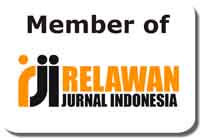Functioning Expressive Speech Acts in the 2019 Indonesian Presidential Election Debates
Abstract
Keywords
Full Text:
PDFReferences
Arisnawati, Nurlina. (2020). Satire Language Style As A Form of Communication Indirect in the Laiyolo Language. Jurnal Kebahasaan dan Kesustraan, 18 (2), 136-148.
Bessler, Abigail. (2017). The Use of Humor by Presidential Candidates from Kennedy to Trump and the Path to Power Through One-Liners, Talk Shows, and Tweets. A Thesis. Yale: Yale University.
Bleuel, William. (2010). The GBR Book Corner Reviews: A Complaint Is a Gift by Janelle Barlow and Claus Moller. Gbr.pepperdine.edu. Retrieved May 3, 2021.
Chiles, Benjamin W. & Roloff, Michael E. (2014). Apologies, Expectations, and Violations: An Analysis of Confirmed and Disconfirmed Expectations for Responses to Apologies. Communication Reports, 27 (2): 65–77.
D'Errico, F. & Poggi, I. (2012). Blame the Opponent! Effects of Multimodal Discrediting Moves in Public Debates. Cogn Comput 4, 460–476
Duffy, James D. & Valentine, Alan (2010). MD Anderson Manual of Psychosocial Oncology. New York City: McGraw Hill Professional.
Feilin, Li, Gaofeng, Yu. (2005). Cultural Differences in Compliments. Canadian Social Science Journal, 1 (1), 68-72.
Feldman, Richard & Warhead, Ted A. (2010). Disagreement. Oxford: Oxford University Press.
Frances, Frances & Matheson, Jonathann. (2019). Disagreement. In Zalta, Edward N. (ed.). Stanford Encyclopedia of Philosophy.
Fredrickson, Barbara L., et al. (2008). Open Hearts Build Lives: Positive Emotions, Induced Through Loving-Kindness Meditation, Build Consequential Personal Resources. Journal of Personality and Social Psychology, 95, 1045–1062.
McGregor, J. Allister, Camfield, Laura, & Woodcock, Alison. (2009). Needs, Wants and Goals: Wellbeing, Quality of Life and Public Policy. Applied Research Quality Life, 4,135–154.
Gusthini, Misyi, Sobarna, Cece, & Amalia, Rosaria Mita. 2018. A Pragmatic Study of Speech as an Instrument of Power: Analysis of the 2016 USA Presidential Debate. Studies in English Language and Education Journal, 5(1), 97-113.
Herfani, Febriani Khatimah & Manaf, Ngusman Abdul. (2020). Tindak Tutur Komisif dan Ekspresif dalam Debat Capres-Cawapres pada Pilpres 2019. Jurnal Bahasa dan Sastra, 8 (1), 35-51.
Hillier, Paul Neyron. (2015). Rethinking Media and Technology: What the Kennedy-Nixon Debate Myth Can Really Teach Us. Online Journal of Communication and Media Technologies, 5 (2), 143-156.
Irwandi, Hudri, Muhammad, & April, Wanda. (2018). An Analysis of Illocutionary Acts of Hillary Clinton's Concession Speech to Donald Trump in Presidential Election. Journal of English Language Teaching and Linguistics (JELTL), 11 (1), 1-4.
Itiqomah, Nurul & Sofyan, Imam. (2015). Kritik Sosial Politik Dalam Karikatur. Jurnal Komunikasi, 10 (2), 189-202.
Jazeri, M. (2018). Communication Culture in Political Debate in Indonesia. In The 1st International Seminar on Language, Literature and Education, KnE Social Sciences, 364–376.
Malle, Bertram F., Guglielmo, Steve, Monroe, Andrew E. (2014). Theory of Blame. Psychological Inquiry, 25, 147–186.
Meiirbekov, A. K., Elikbayev, B. K., Meirbekov, A. K., & Temirbaev, B. A. (2015). Sociolinguistic Aspects of thespeech act of greeting in the Kazakh and English languages. Mediterranean Journal of Social Sciences, 6(6), 267-274.
Mufiah, Nura Siti & Rahman, Muhammad Yazid Nur. (2018). Speech Acts Analysis of Donald Trump's Speech. Professional Journal of English Education, 1 (2), 125-132.
Panjaitan, Hondi. (2014). Pentingnya Menghargai Orang Lain. HUMANIORA, 5 (1), 88-96.
Rosyidi, Ahmad Zuhri, Mahyuni, & Muhaimi. (2019). Illocutionary Speech Acts Use by Joko Widodo in First Indonesia Presidential Election Debate 2019. International Journal of Multicultural and Multireligious Understanding, 6 (2), 735-740.
Sartika, Tini. (2021). Critical Discourse Analysis of Donald Trump's and Joe Biden's Language in Use in the 2020 United States Presidential Debates. Proceedings International Conference on Education of Suryakancana, 412-417.
Seldon, Anthony. (2012). The Politics of Optimism. Research Note.
Setyani, Turita Indah. (2013). Makna Kebhinekaan Ungkapan Terima Kasih dalam Dimensi Fenomenologi Budaya di Indonesia. Seminar Internasional Kebhinekaan dan Kebudayaan Indonesia FIB UI, 10-11 Desember 2013.
Shafa, Said, Harinck, Fieke, & Ellemers, Naomi. (2017). Sorry seems to be the hardest word: Cultural differences in apologizing effectively. Wiley: Journal of Applied Social Psychology, 47, 553-567.
Sihidi, Iradhad Taqwa, Roziqin, Ali, & Suhermanto, Dedik Fitra. (2020). Pertarungan Populisme Islam dalam Pemilihan Presiden 2019. JIIP: Jurnal Ilmiah Ilmu Pemerintahan, 5 (2), 174-189.
Siregar, Fajri, Usmani, Mona Luthfina, Kumaralalita, Larastri, Nufaisa, Halida, & Putri, Dinita Andriani. (2017). Complaining to improve governance: four stories of complaint-handling systems in Indonesia. Research report.
Sløk-Andersen, Beate (2019). The Butt of the Joke? Laughter and Potency in the Becoming of Good Soldiers. Cultural Analysis, The University of California, 17 (1), 25–56.
Visser, J., Konat, B., Duthie, R. et al. (2020). Argumentation in the 2016 US presidential elections: annotated corpora of television debates and social media reaction. Lang Resources & Evaluation, 54, 123–154.
Yin, Robert K. (2018). Case Study Research and Application: Design and Methods (Sixth edition). Los Angeles: Sage.
DOI: http://dx.doi.org/10.31332/lkw.v7i1.2573
Copyright (c) 2021 Azwar Abbas

This work is licensed under a Creative Commons Attribution-ShareAlike 4.0 International License.
Langkawi: Journal of The Association for Arabic and English indexed by:


















.png)
.png)

.png)
2.png)








